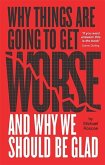As consumers and providers we overlook the importance of healthy, coherent endings. There was once a rich culture of reflection and responsibility, but over recent centuries this has been lost. Producing a mixture of long term societal oversight, and short term denial. We are left with a bias customer lifecycle that is limited to the exciting vocabulary geared strictly around all things new. Giving rise to guilt-free consumers, an overly-blamed business sector and a society which finds itself at a loss when it needs to grapple with responsibility and consumptions biggest ills. In a world awash with start-ups and new tech, this book tells you why its critical we start considering endings. 'Right to be Forgotten', is the ambitious law of the European Union that protects a persons rights in a digital world that can't acknowledge removal of the items we have been encouraged to share. Nearly 30 years of Climate Change discussion and we still fail to accept the implications of ending our carbon consumption. Revenge porn, rising anxiety rates in young adults and increasing use of VPNs are reactions from a digital society without a foreseeable end to their digital content. Lacking a vocabulary to safely dispose of electronics, is there any surprise we only achieve 12.5% recycling of e-waste, despite an increase in sales of consumer electronics and a faster turnover of usage. Our homes are cluttered with on average 300,000 items. Instead of ending these product relationships, we prefer to seek alternatives in off-site storage - the largest growing real estate sector, according to the New York Times. We fail to consider endings in services that specifically deal with the end of our lives. In the UK we have on average 11 employers throughout our career, each provides us with a pension pot. According to Age Concern, a UK charity, 1 in 4 of these goes missing just when people need it most. Ends makes a compelling case that demonstrates how, over centuries, our changing relationship with death has led to the loss of our relationship with endings. Giving rise to guilt-free consumers, an overly-blamed business sector and a society which finds itself at a loss when it needs to grapple with responsibility. Drawing on a plethora of sources in history, sociology, psychology and industry, Ends argues that we are taking the wrong approach to challenging the impact of consumption and that we need to create coherent endings in our product, service and digital experiences to rebalance this.
Dieser Download kann aus rechtlichen Gründen nur mit Rechnungsadresse in A, B, CY, CZ, D, DK, EW, E, FIN, F, GR, H, IRL, I, LT, L, LR, M, NL, PL, P, R, S, SLO, SK ausgeliefert werden.
Hinweis: Dieser Artikel kann nur an eine deutsche Lieferadresse ausgeliefert werden.









